#law
Washington: Initiative Measure Targets Toll Roads
Voters in Washington state will decide in November whether to slow down the state’s push toward tolling. Initiative 1125 prohibits lawmakers from diverting toll road revenue and other levies on motorists toward non-transportation purposes. It also forces politicians to vote directly on any toll hikes.
“If there’s going to be tolls, there has to be accountability and transparency,” initiative co-sponsor Tim Eyman of Voters Want More Choices wrote in an email. “It’s simply not too much to ask for taxpayers who are being forced to pay twice for their roadway infrastructure (the highest gas tax in the nation and tolls) that the legislature be required to follow the law and abide by the Constitution.”
Tennessee: Man Sues Traffic Camera Company Over Double Billing
Drivers often get the run around when dealing with the traffic ticket bureaucracy. When fighting city hall, individuals usually have no little hope of prevailing. Motorist Harry A. Church realized that with red light cameras, the system was outsourced from city hall to a company that could be more easily sued. After being double-billed by the Australian red light camera company Redflex Traffic Systems, Church filed a lawsuit that has been taken up by the US District Court for the Eastern District of Tennessee.
California: More Cities Dropping Red Light Cameras
Three Southern California cities are taking steps to rid themselves of red light cameras. In Westminster, the city council decided unanimously on Wednesday to ask voters to ban the use of red light cameras in a referendum scheduled for November 2012.
“We gave very clear instructions… to city managers that this red light camera system will not be discussed or considered to be installed in any part of our city,” Councilman Andy Quach said on Wednesday. “Tonight is basically a reiteration of that already existing policy…. The council has historically never liked anything that could be considered monitoring its citizens by Big Brother.”
Today, In Bad Brand Biting
Massachusetts Court Denies Meaningful Right to Contest Parking Tickets
The highest court in Massachusetts believes there is no due process problem with charging motorists $300 to challenge a $5 or $15 parking ticket. On Thursday, the Supreme Judicial Court ruled that the appeal procedures in the city of Northampton satisfied constitutional requirements even though motorists were denied an in-person hearing to contest the legitimacy of a citation. The city only allowed people either to pay the fine in full or send “a signed statement explaining his objections.”
South Carolina Supreme Court Busts Town for Ignoring Camera Law
In 1998, South Carolina lawmakers mandated that police use dashboard mounted cameras to document the arrest of anyone arrested for driving under the influence of alcohol (DUI). The state supreme court on Monday ruled that the town of Mount Pleasant was not in compliance with this statute, which states a suspect “must have his conduct at the incident site and the breath test site video recorded.”
New Jersey: Court Approves Private GPS Spying
Police are not alone in the ability to secretly use GPS devices to track someone without his knowledge, the New Jersey Superior Court’s Appellate Division ruled Thursday. A three-judge panel made this decision in the context of a privacy invasion suit brought by Kenneth R. Villanova against Innovative Investigations Inc after his now ex-wife hired the private-eye company to spy on him. She intended to document alleged infidelities prior to filing for divorce in May 2008. At the firm’s suggestion, Villanova’s wife installed the tracking device on her husband’s GMC Yukon-Denali which followed the vehicle’s every move for forty days.
What's A Mercury Franchise Worth?
Ford hasn’t built a Mercury in six months and 98 percent of its erstwhile dealers have signed termination agreements with the parent company, but the remaining 31 dealership owners are digging in their heels for a fight. Automotive News [sub] reports that these Mercury dealers recently spent huge amounts building or renovating their Lincoln/Mercury stores, and that Ford’s termination offers are embarrassingly tiny in comparison.
For example, the owner of Francis Scott Key L-M Inc. in Frederick, Md. claims to have spent $5.5m on a dealership expansion which was completed in 2007, but only received a termination offer of $181,026 from Ford. Liberty Lincoln-Mercury in Clifton, N.J spent $7.7m upgrading its facilities in 2004, only to receive a $733,575 termination offer from Ford. So far, AN counts four dealers who are suing Ford in federal court, and an undisclosed number have filed complaints with their state DMV. Ford, meanwhile, is trying to engage the holdouts in mediation, and though some have settled others are reporting bad experiences. Meanwhile, there’s another problem that underlines the the entire dispute: can a standalone Lincoln dealership even survive?
Washington: City Sued for Blocking Anti-Camera Referendum
Opponents of red light cameras and speed cameras are taking the offensive against city councils and camera vendors who have been taking extreme measures to keep the issue of automated ticketing off the ballot. A Cowlitz County, Washington superior court judge will hear arguments later today in a countersuit that accuses the city of Longview of violating an anti-SLAPP law. The state last year banned what are called “strategic lawsuits against public participation” with a measure that grants expedited court procedures to initiative sponsors and a $10,000 penalty against anyone found to be exploiting the legal system to thwart a petition drive.
California Court Softens Ban on Testimony Questioning Breathalyzer Accuracy
Since 1994, the California courts have banned defendants from using scientific evidence to challenge certain charges for driving under the influence of alcohol (DUI). To foil defense attorneys who had become increasingly successful with juries, the state created a “per se” DUI charge that made it a crime to have 0.08 reading on a breathalyzer machine regardless of whether an individual was actually drunk or had a 0.08 percent blood alcohol content (BAC) level. Because of physiological variability among individuals, some people with the same blood alcohol level might read higher or lower on the breath machine. Challenges based on these differences are known as “partition ratio” arguments. The California Court of Appeal on Friday loosened what had become effectively a ban on scientific criticism of breathalyzer reliability.
IIHS Red Light Camera Study "Not Credible"
[Editor’s note: My take on the IIHS study’s shortcomings can be found here]
The public relations arm of the insurance industry yesterday released a report claiming red light cameras are popular in big cities. About 24 hours after Insurance Institute for Highway Safety (IIHS) had begun spinning this study to media outlets, only a handful had run stories. Editors at one daily publication told TheNewspaper that they passed on writing about a claim they did not find credible.
IIHS Study Loves Red Light Cameras, Says Americans Do Too
The controversy over red light cameras, once relegated to websites like TTAC, thenewspaper.com, motorists.org and highwayrobbery.net, is hitting the mainstream media thanks to a new study by the IIHS [ PDF here]. The study used the following methodology:
Telephone surveys were conducted with 3,111 drivers in 14 large cities (population greater than 200,000) with long-standing red light camera programs and 300 drivers in Houston, using random samples of landline and cellphone numbers. For analyses combining responses from the 14 cities, cases were weighted to reflect each city’s share of the total population for the 14 cities.
And what did they find?
Among drivers in the 14 cities with red light camera programs, two-thirds favor the use of cameras for red light enforcement, and 42 percent strongly favor it. The chief reasons for opposing cameras were the perceptions that cameras make mistakes and that the motivation for installing them is revenue, not safety. Forty-one percent of drivers favor using cameras to enforce right-turn-on-red violations. Nearly 9 in 10 drivers were aware of the camera enforcement programs in their cities, and 59 percent of these drivers believe the cameras have made intersections safer. Almost half know someone who received a red light camera citation and 17 percent had received at least one ticket themselves. When compared with drivers in the 14 cities with camera programs, the percentage of drivers in Houston who strongly favored enforcement was about the same (45 percent), but strong opposition was higher in Houston than in the other cities (28 percent versus 18 percent).
Sounds like those red light cameras are pretty great after all, doesn’t it? That’s certainly the IIHS’s takeaway…
Washington: Anti-Camera Group to Shame City Council
Opponents of automated ticketing machines in Monroe, Washington have turned to a new tactic in battling a city council that refuses to give up the use of red light cameras and speed cameras. Instead of engaging the city and a wealthy traffic camera company in a costly legal battle, the group BanCams.com decided Wednesday to shame the council at every election until officials follow the public will.
Decision Overturning Houston Anti-Camera Referendum Appealed
The battle over the Houston, Texas red light camera program returned to the legal spotlight Monday. A majority of voters agreed with Francis M. Kubosh and Randall Kubosh in November that the automated ticketing machines should be removed, but a federal judge intervened earlier this month and overturned the election ( view ruling). The Kuboshes filed a reply brief with the US Court of Appeals for the Fifth Circuit Monday seeking to restore the result of the public vote.




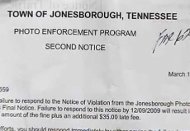




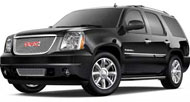


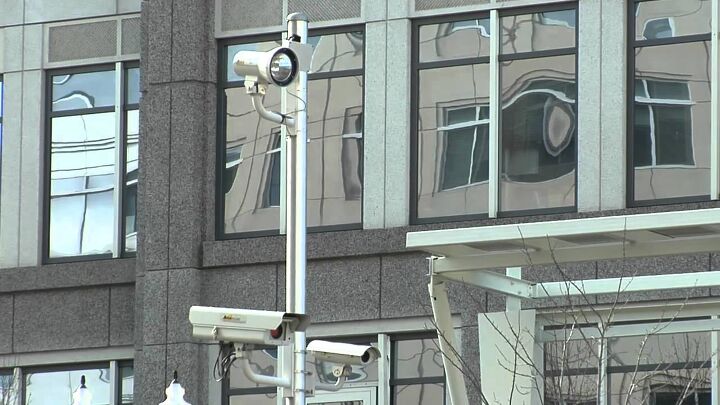

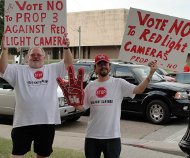
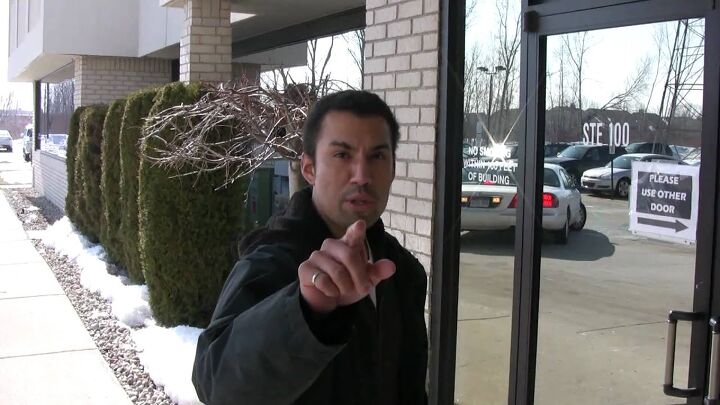












Recent Comments